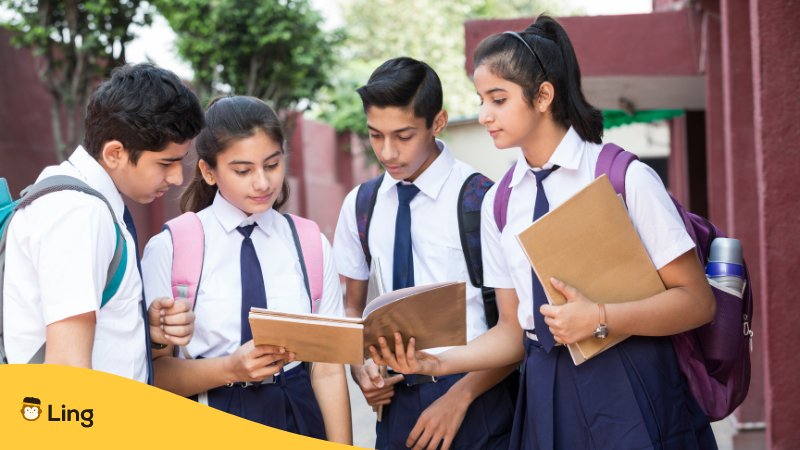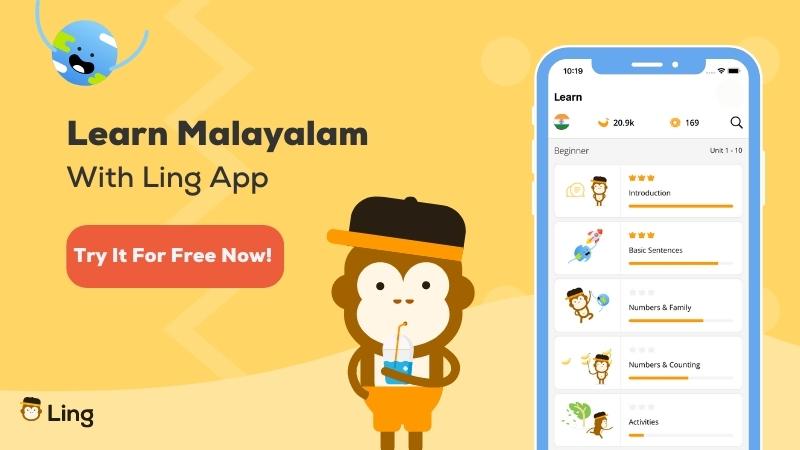Can’t get enough of the Malayalam language? How about you get your hands on some common Malayalam school phrases to expand your horizon and become an elite speaker in just a few practices?
While common words and phrases have already familiarized you with the official language of Kerala, if you want to truly understand the culture and language of the locals, you have to go below and walk through the basics. Especially, if you are traveling to Kerala for educational purposes soon, the best way to adapt to the Malayali culture is by understanding some of the primary words and phrases related to school- സ്കൂൾ (skūḷ) in the Malayalam language.
So, in today’s post, we will learn all the essential sentences and words that locals use in school on a daily basis. With proper spoken pronunciation along with some educational facts, you are sure to get the best of the Malayalam language today. Want to learn Malayalam more? Continue reading!
Page Content
- Educational System In Kerala: Facts
- Basic Malayalam School Phrases
- School Phrases For Students In The Malayalam Language
- School Phrases For Teachers In Malayalam
- School Vocabulary
Educational System In Kerala: Facts
Before we jump into the vocabulary section, here is a list of facts to make you aware of the occurrent educational system of Kerala.
- Since the introduction of British education by Catholic and Christian missionaries during colonial times, Kerala has surpassed every societal hurdle and stood out as one of the most literate states of India. It has the highest girl literacy rate, and most rural areas are exposed to education and facilities, leading to development.
- Kerala’s education system is usually established by institutions aided or owned by the government, both central and state. The system that prevails in Kerala requires students to go for ten years of schooling. Those years are divided into lower primary, upper primary, and high school. Once ten years of schooling is complete, one is expected to go for +2 years of higher secondary school, also known as Class 11 and 12. In the higher secondary stage, they can choose from three streams, arts (humanities), science, or commerce.
- Once the entire 12 years of schooling is complete, under-graduation takes place. Students are expected to take different courses in colleges and institutions run by the government or private trusts. After undergraduate, if a student wishes to go for a Master’s Degree, they are prompted to do so. However, the basic requirement that the Indian state asks for is usually an undergraduate degree. Nevertheless, with a growing economy, employment demands have also increased, leading to expectations of higher educational qualifications.
- Kerala has many colleges and universities that provide higher studies and attract students worldwide. In fact, the Kerala school of astronomy and mathematics escalated during the 16th century when it attempted to solve astronomical problems and created mathematical concepts.
Universities In Kerala
- Kerala University, Thiruvananthapuram
- Mahatma Gandhi University, Kottayam
- Calicut University, Trichy Palary
- National University of Advanced Legal Studies (NUALS) Kaloor, Kochi
- Cochin University of Science & Technology, Kochi
- Central University of Kerala, BKM Towers
Basic Malayalam School Phrases

Learning the following common words and phrases will get you through your Malayali school life and help you communicate with the locals to make meaningful bonds. So, to make your Kerala experience fun, let’s get started.
1. Hello! How Are You?
Translation: ഹലോ! എങ്ങനെയിരിക്കുന്നു?
The first phrase we need to learn is the basic greeting phrase ഹലോ! എങ്ങനെയിരിക്കുന്നു?- halēā! eṅṅaneyirikkunnu? Malayali people are very courteous and kind. So, no matter where you go, you must greet them with a smile to start pure relations. Especially as a new kid, you will constantly need this phrase for genuine formalities.
2. Where Is The Principal’s Office?
Translation: പ്രിൻസിപ്പലിന്റെ ഓഫീസ് എവിടെയാണ്?
One of the most-used phrases in Malayalam would be പ്രിൻസിപ്പലിന്റെ ഓഫീസ് എവിടെയാണ്?- prinsippalinṟe ōphīs eviṭeyāṇ? once you reach your school. As a newcomer, you will have to go back and forth to the principal’s office and admin window. So, the easiest guide would be to ask a local and get directions.
3. Where Is The Canteen?
Translation: കാന്റീന് എവിടെയാണ്?
Apart from the previous phrase, another constant would be കാന്റീന് എവിടെയാണ്?- kānṟīn eviṭeyāṇ? Well, who doesn’t like going to school canteens? It is not just about the food, but canteens also become the best place to explore with the locals and make new friends through the language of food and table.
4. What Is Your Name?
Translation: നിന്റെ പേരെന്താണ്?
In order to get acquainted with the Kerala people, you will first need their names. So, if you plan to make friends, keep the phrase നിന്റെ പേരെന്താണ്?- ninṟe pērentāṇ? saved in your brain.
When someone asks you the same question, you can politely reply by saying എന്റെ പേര്…- enṟe pēr… (My name is…).
5. When Is Lunch Time?
Translation: ഉച്ചഭക്ഷണ സമയം എപ്പോഴാണ്?
If you are unaware of your lunch routine on the first day, you can ask your classmates by asking ഉച്ചഭക്ഷണ സമയം എപ്പോഴാണ്?- uccabhakṣaṇa samayaṁ eppēāḻāṇ? It is best to communicate and make sure you are on the same page as the rest or you might bring in trouble unintentionally on the first day itself.
6. Do We Have Class Now?
Translation: ഞങ്ങൾക്ക് ഇപ്പോൾ ക്ലാസ്സുണ്ടോ?
If you are confused about whether you have class or not, the soundest way to get out of the confusion is by asking your mates ഞങ്ങൾക്ക് ഇപ്പോൾ ക്ലാസ്സുണ്ടോ?- ñaṅṅaḷkk ippēāḷ klās’suṇṭēā? It will not just help you with the routine but also allow you to start your first conversation with them.
7. Can I Join You?
Translation: എനിക്ക് നിങ്ങളുടെ കൂടെ ചേരാമോ?
Entering a new school with no acquaintances can become very stressful. However, to join in with the locals and make yourself feel at home, the phrase എനിക്ക് നിങ്ങളുടെ കൂടെ ചേരാമോ?- enikk niṅṅaḷuṭe kūṭe cērāmēā? will surely come in handy. Whether it is about sharing a table or a particular club activity, it works anywhere.
8. Can You Please Help Me With…
Translation: ദയവായി എന്നെ സഹായിക്കാമോ…
If you fall in any trouble or want help concerning something, you can politely ask the locals to do you a favor by asking ദയവായി എന്നെ സഹായിക്കാമോ…- dayavāyi enne sahāyikkāmēā… It is an essential polite phrase that will come in handy in different situations as well.
9. Nice To Meet You
Translation: നിന്നെ കാണാനായതിൽ സന്തോഷം
Do I even need to mention this? The basic rule of making good friends and a first good impression is by saying something generous. And what can be a better way of ending your first chat in school than saying നിന്നെ കാണാനായതിൽ സന്തോഷം- ninne kāṇānāyatil santēāṣaṁ to acknowledge your mate’s existence?
School Phrases For Students In The Malayalam Language
Now that you know the basic phrases, here is a list of sentences related exclusively to students. If you are one, you can use it to bond with your new surroundings and make your school days exciting by impressing the locals with your skills.
Greetings And Conversations
| English | Malayalam | Pronunciation |
| Where are you from? | നീ എവിടെ നിന്ന് വരുന്നു? | nī eviṭe ninn varunnu? |
| I am from… | ഞാൻ വരുന്നത്… | ñān varunnat… |
| Are you in the same class? | നിങ്ങൾ ഒരേ ക്ലാസിലാണോ? | niṅṅaḷ orē klāsilāṇēā? |
| What is your subject? | നിങ്ങളുടെ വിഷയം എന്താണ്? | niṅṅaḷuṭe viṣayaṁ entāṇ? |
| Do you like science? | നിങ്ങൾക്ക് ശാസ്ത്രം ഇഷ്ടമാണോ? | niṅṅaḷkk śāstraṁ iṣṭamāṇēā? |
| Do you speak English? | നീ ഇംഗ്ലീഷ് സംസാരിക്കുമോ? | nī iṅglīṣ sansārikkumēā? |
| Can I join you in the canteen? | എനിക്ക് നിങ്ങളോട് കാന്റീനിൽ ചേരാമോ? | enikk niṅṅaḷēāṭ kānṟīnil cērāmēā? |
| I can share my tiffin with you | ഞാൻ എന്റെ ടിഫിൻ നിങ്ങളുമായി പങ്കിടാം | ñān enṟe ṭiphin niṅṅaḷumāyi paṅkiṭāṁ |
| Would you like to sit with me? | എന്നോടൊപ്പം ഇരിക്കാൻ നിങ്ങൾ ആഗ്രഹിക്കുന്നുണ്ടോ? | ennēāṭeāppaṁ irikkān niṅṅaḷ āgrahikkunnuṇṭēā? |
| See you tomorrow! | നാളെ നിന്നെ കാണാം! | nāḷe ninne kāṇāṁ! |
Doubts And Questions
| English | Malayalam | Pronunciation |
| I have a doubt… | എനിയ്ക്ക് ഒരു സംശയമുണ്ട്… | eniykk oru sanśayamuṇṭ… |
| May I come in? | ഞാൻ അകത്തേക്ക് വരട്ടെ? | ñān akattēkk varaṭṭe? |
| May I go to the washroom? | ഞാൻ ശുചിമുറിയിൽ പോകട്ടെ? | ñān śucimuṟiyil pēākaṭṭe? |
| I don’t understand this problem | ഈ പ്രശ്നം എനിക്ക് മനസ്സിലാകുന്നില്ല | ī praśnaṁ enikk manas’silākunnilla |
| Can I have extra classes? | എനിക്ക് അധിക ക്ലാസുകൾ നടത്താമോ? | enikk adhika klāsukaḷ naṭattāmēā? |
| What is our homework today? | ഇന്നത്തെ നമ്മുടെ ഗൃഹപാഠം എന്താണ്? | innatte nam’muṭe gr̥hapāṭhaṁ entāṇ? |
| Can I submit my assignment tomorrow? | എനിക്ക് നാളെ എന്റെ അസൈൻമെന്റ് സമർപ്പിക്കാമോ? | enikk nāḷe enṟe asainmenṟ samarppikkāmēā? |
School Phrases For Teachers In Malayalam

If you are transferring as a teacher in Kerala, this section is for you. You can learn all the sentences from the below table and make your classes fun with the local students.
| English | Malayalam | Pronunciation |
| Good morning, students! | സുപ്രഭാതം, വിദ്യാർത്ഥികളേ! | suprabhātaṁ, vidyārt’thikaḷē! |
| Did you complete your homework? | നിങ്ങളുടെ ഗൃഹപാഠം പൂർത്തിയാക്കിയോ? | niṅṅaḷuṭe gr̥hapāṭhaṁ pūrttiyākkiyēā? |
| What were we discussing? | ഞങ്ങൾ എന്താണ് ചർച്ച ചെയ്തിരുന്നത്? | ñaṅṅaḷ entāṇ carcca ceytirunnat? |
| Why are you late again? | എന്തുകൊണ്ടാണ് നിങ്ങൾ വീണ്ടും വൈകുന്നത്? | entukeāṇṭāṇ niṅṅaḷ vīṇṭuṁ vaikunnat? |
| Please keep silence | ദയവായി നിശബ്ദത പാലിക്കുക | dayavāyi niśabdata pālikkuka |
| No one will talk | ആരും സംസാരിക്കില്ല | āruṁ sansārikkilla |
| May I have your attention, please? | ദയവായി എനിക്ക് നിങ്ങളുടെ ശ്രദ്ധ നൽകാമോ? | dayavāyi enikk niṅṅaḷuṭe śrad’dha nalkāmēā? |
| This is your homework for today | ഇതാണ് ഇന്നത്തെ നിങ്ങളുടെ ഗൃഹപാഠം | itāṇ innatte niṅṅaḷuṭe gr̥hapāṭhaṁ |
| I will take a surprise test | ഞാൻ ഒരു സർപ്രൈസ് ടെസ്റ്റ് നടത്തും | ñān oru sarprais ṭesṟṟ naṭattuṁ |
| No class tomorrow | നാളെ ക്ലാസ്സില്ല | nāḷe klās’silla |
| I am going to teach… | ഞാൻ പഠിപ്പിക്കാൻ പോകുന്നു… | ñān paṭhippikkān pēākunnu… |
| Is there any doubt? | എന്തെങ്കിലും സംശയമുണ്ടോ? | enteṅkiluṁ sanśayamuṇṭēā? |
| Am I audible? | ഞാൻ കേൾക്കുന്നവനാണോ? | ñān kēḷkkunnavanāṇēā? |
| Is everything clear? | എല്ലാം വ്യക്തമാണോ? | ellāṁ vyaktamāṇēā? |
School Vocabulary
| English | Malayalam | Pronunciation |
| Answer | ഉത്തരം | uttaraṁ |
| Book | പുസ്തകം | pustakaṁ |
| Class | ക്ലാസ് | klās |
| Classmate | സഹപാഠി | sahapāṭhi |
| College | കോളേജ് | kēāḷēj |
| Classroom | ക്ലാസ് റൂം | klās ṟūṁ |
| Exam | പരീക്ഷ | parīkṣa |
| Elementary school | പ്രാഥമിക വിദ്യാലയം | prāthamika vidyālayaṁ |
| Homework | ഹോംവർക്ക് | hēānvarkk |
| Hostel | ഹോസ്റ്റൽ | hēāsṟṟal |
| High school | ഹൈസ്കൂൾ | haiskūḷ |
| Lunch break | ഉച്ചഭക്ഷണ ഇടവേള | uccabhakṣaṇa iṭavēḷa |
| Middle school | മിഡിൽ സ്കൂൾ | miḍil skūḷ |
| Principal | പ്രിൻസിപ്പൽ | prinsippal |
| Question | ചോദ്യം | cēādyaṁ |
| Result | ഫലമായി | phalamāyi |
| School | സ്കൂൾ | skūḷ |
| Student | വിദ്യാർത്ഥി | vidyārt’thi |
| Teacher | ടീച്ചർ | ṭīccar |
| Uniform | ഒരേപോലെ | orēpēāle |
| University | യൂണിവേഴ്സിറ്റി | yūṇivēḻsiṟṟi |
Happy Schooling!
Did you enjoy learning the above examples? With these, you will surely develop your language skills and cultural insights simultaneously. Language learning is not just about getting familiar with different national lingos but also about gaining knowledge and enlightening yourself about different cultures. It develops you both linguistically and personally. So, if you want to learn more about Kerala’s people and their routines, you can head out to the Ling app. With multiple services and content, the app will undoubtedly become your best guide. To download the app, you can easily find it on Appstore or Playstore.
Learn Malayalam With The Ling App

The Ling app is one the most accessible language learning apps that provide multiple contents on topics such as food, sports, weather, health, and more. All you need to do is download the app for free and start accessing the different features and blog posts.
As commented by users, the best part of the app is the AI Chatbot system. It is a feature that proffers interactive lessons, which helps you converse comfortably and retain lessons efficiently. Moreover, quizzes, dialogues, and mini-games will help you remember everything you have learned with proper practice.
In case you want to learn other languages like Hindi, Punjabi, or even European languages, you can do so easily. Ling app covers more than 60+ languages currently with the help of expert writers who ensure that you speak the language you desire. So, download the app today and learn efficiently with Ling!



































































